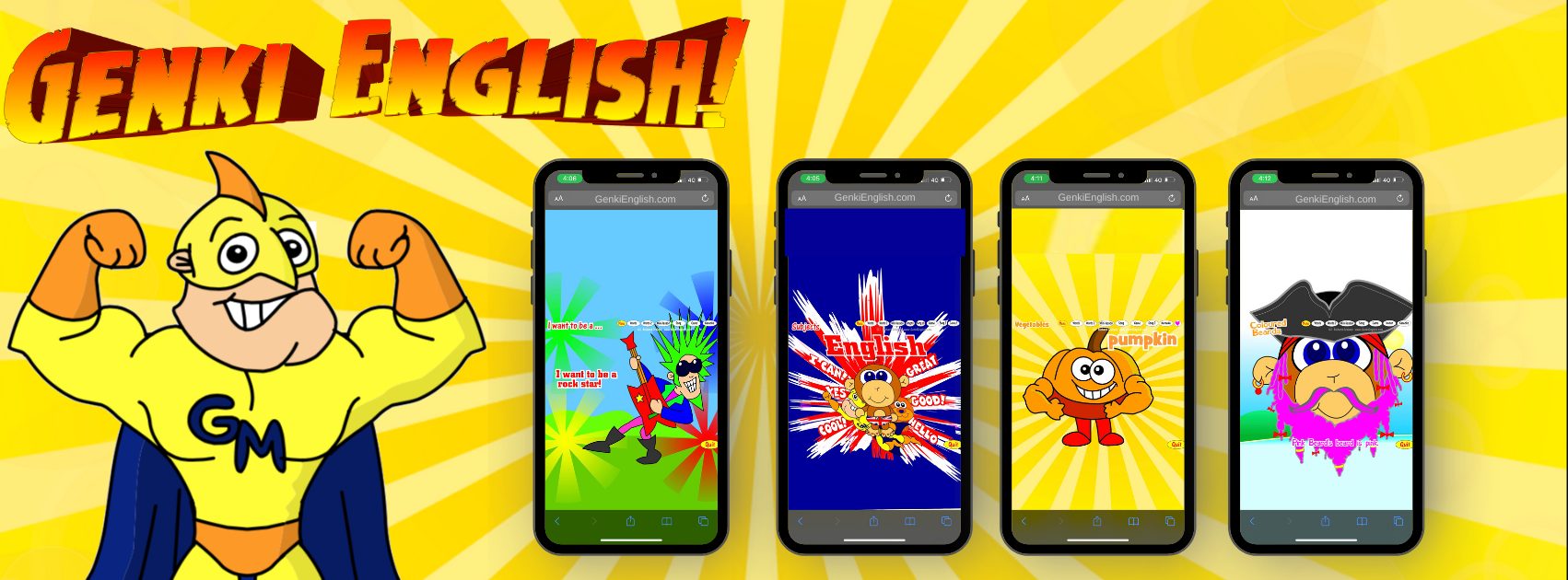My plan for today was Hip Hop Songs, probably Have you ever, to show the staff that GE works for any level. Then use the funky “Genki English Conversation Generator” to practice the English in a game. You’ll have to remind me to upload that because it’s really great for advanced classes, it sparks so many great conversations.
Or if the students weren’t at that level I’d do How are you? -> What do you think of? Then get one student to ask each person in turn “How are you?” then from memory say “I think she’s happy and he’s hungry and she’s tired, but he’s OK” get it right and you get a point. This is to get them used to making long sentences as well as getting an exchange of information. “I think ..” is a really useful phrase for adults. I think it’s the phrase I use the most in Chinese. Oops, just used it again!
I’m a …
In the event though it seemed like everyone had missed their morning Starbucks! I did the motivation talking but the class teacher who was translating was more like “well, he says to be sort of confident and stuff, if you like, and maybe speak up a bit, well maybe, if you want, sort of” So it was pretty much an uphill struggle! Thanks to the lackluster translation they thought confident voices, answering my questions and eye contact were optional. Any teacher should know they’re not, but I also have to take responsibility because I can’t really expect them to respect what I say if I can’t do it in their language yet.
After I did get them to smile and loosen up a bit, they were also having trouble expressing words they didn’t know. For example they just froze up when asking about their jobs, rather than trying to describe, or even gesture, what they do. This is one key skill, the ability to use skills you have to describe something you don’t yet know how to say. It’s the reason companies spend so much money on business workshops that concentrate on body language and expressions.
The I have a question theme is usually how it get round this. So I went through the game really slowly. If you’re not familiar with it, what you do is to put up flashcards of nouns, fruit and animals and things on the board, pick one and the students have to describe it without using the name of the object. For example in the song they learn to ask, with gestures, “Is it an animal? Is it a fruit? Is it big? Is it small? Is it red? Is it green?” etc.
Just read…
But today they didn’t know the fruits or animal names and they didn’t even know the colours or simple adjectives. They were really, really stuck. Much more than even say a Japanese or European class where much more of the language is similar to English.
That’s fair enough. If they were a beginners class I’d be happy with this and just teach them the new English, after all that’s what GE is there for, what it does best and what they come to lessons for.
But…. these students are using Jack Richard’s Interchange as their textbook! How on Earth can they possible comprehend anything at all in the book if they are at this level? What do they do in normal lessons? Well, I bet I do know, I bet they just “read” through it looking up words in a dictionary then say they’ve finished that part.
The first step: “I don’t know”
I still had 20 minutes left so figured I’d just try and teach them something new, so I just did the colours lesson as they really only knew a couple. They did actually improve, which was good. But they were also having problems admitting when they didn’t know something. Again this is a crucial skill to admit when you don’t know something and not just say “yes” or give a blank stare!
My usual line on that is “Saying I don’t know is the first step to learning something new”. Then I’m thinking, hang on, that’s Chinese philosophy! What am I doing teaching them this? One of the big barriers here has been “some teachers only know the traditional way of teaching, they aren’t used to this innovative way”. But there’s nothing innovative about Genki English at all, it’s the traditional ways of teaching that have been used for centuries, Confucius or Bruce Lee didn’t teach like they do! I tell you we should do a Chinese philosophy class with them first!
Just let the computer do the work…
Anyway, I didn’t get to try out any advanced stuff because, unlike the textbooks, with Genki English if you can’t do the English then you can’t do any of the activities, and I didn’t want to demotivate the students in that way. So to sort of finish on a bit of a high note I put them on the Fruit Market computer game. In a small group of students, up to say 7 or 8, this is actually a really good way for them to learn vocab they don’t yet know. It’s also really easy for the teacher, just sit back and watch them learn. At the start the only word they knew was “banana”. So it took 20 minutes for them to learn them all and finish. Then the teacher said “I think this is for kids, it’s too easy.” Ahhh. Then they went off to read through their textbook…
P.S. for some happy news check back tomorrow for some very cool new printables!




BOy Richard, what a day… I feel for you. When I was in the university, my best friend was from Shangai. SHe was in the states studying French! I spent hours and hours helping her in English mostly.
I found that it is very Chinese to be polite and say, yes I understand when they haven’t gotten it at all, but then insist they have! 5 min later she would ask me the same thing all over again! She was so in-grained in memorization, she didn’t know how to learn any other way! She ended up taking a year longer and got her diploma by the skin of her teeth and told her she would not continue on at that university. She worked super hard but I felt bad that she just couldn’t break free from her CHinese learning patterns.
Please don’t put this on your blog.
I’m afraid you are so busy thinking about many things (adult courses, phonics, etc. etc.) that comment competition has just slipped out of your mind? But I’m sorry if it’s not the case. 🙂
Have a good day!!
Assuming GE is for kids and therefore too easy is one of the problems I’ve run into a few times with my adult students. In each instance though just giving it a chance has proved to be an eye opener for everyone, however often the “I already know that” (but still I get blank looks in practice) is a persisting problem. For now iv settled on a third GE (to warm up, introduce key sentence’s and review subject from past chapters of the textbook), a third textbook (I use Touchstone )and a third game/ conversation practice for my one-on-one students.
One girl however, after going through the “where do you live” video and being able to accurately tell me where her house is said she didn’t want to bother with the text book we use until we’d worked though a good proportion of GE.
@Yumiko: Yeah, I’ve got two months worth to do! Plus I’ve got some extra things as well, I’ll try and post next week!
@Julian-K: Yeah, I’ve found the students are great with it. As usual it’s the less than genki teachers that are the problem!
@Carol: The thing is that everywhere students do the nodding and say “yes”, just think how many Westerners say the infamous “I understand more than I can speak” line, when they really only think they know. But the actual Chinese way of learning is just the same as GE, so I think that’s a line I’m going to use more in China. Use more Chinese history & Confucius references in my workshops!
On a similar note I do a similar thing in Japan to get people to make eye contact. Some teachers refuse to do it saying” “I am Japanese”. But making eye contact is an incredibly Japanese thing to do, it’s in martial arts and teaching to someone’s “eyeline”. It’s only in recent Samurai times that they forced the peasants to look down when they passed otherwise they chopped their heads off!
The real culprit is England! It all comes down to the purpose of their compulsory education, which the world copied. That was to educate a workforce capable of working, rote learning basic rules, but not capable of thinking too much!
Genki is really impressing the parents of the ONE class I’ve been allowed to teach using Genki only. We’ve gone through about 15 lessons, much of it reviewing what kids had “learned” the previous two years, but we’ve played the games, expanded use of the language…”How are you?” usually just “I’m fine, thanks…or I’m happy.” but now they can mix and match. I’ve also added in extra self-made worksheets often just listening and matching or following directions. For the Pronouns lesson (which comes after the Superhero lesson) I made a worksheet where I have twelve pictures of people doing various things (stretching, climbing, cooking, running, jumping, swimming) and a little box in the corner of each of the pictures. Over QQ, Chinese instant messaging, I said “Number 1, She can climb.” The students then marked the appropriate picture 1.
For the left and right lesson, I found a worksheet on the internet which had instructions for moving about a grid and drawing pictures. It included written instructions but I also sent the instructions orally over QQ. The best part about these homework assignments and Genki songs is that the parents can really grasp what they are learning and covering and can participate in their homework activities. The homework for the regular little kid classes at the school are little more than coloring, tracing letters, and drawing lines from one picture to another of the same picture (English is not really a factor).
I forgot to mention that a few of the parents have come up to me visibly excited, thumbs up, smiles, telling my girlfriend that the class is so much better and that the kids are actually learning useful things.